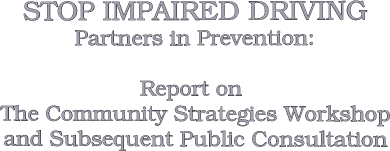
|
II) Results of Workshop Discussions and Public Consultation
3) Law Enforcement
a) What is your opinion about whether police should use Passive
Alcohol Sensors in Manitoba?
- The Workshop discussion groups did not support the use of Passive Alcohol Sensors as an
evidence-gathering instrument.
- Police officers who tried Passive Alcohol Sensors thought that they were unreliable and
could be influenced by alcohol on a passenger's breath. They also objected to them because
they encourage officers to think that they can't do the job without an electronic device
and this takes away from their investigative skills development.
- There was no consensus among public consultation respondents about the value of Passive
Alcohol Sensors. Some thought that they would be useful, some thought more research on the
issue was needed, some thought that police were able to detect impaired drivers without
them and some thought that they were unreliable and would result in offenders taking more
cases to trial to challenge the results.
b) What is your opinion about Standard Field Sobriety Testing and
Drug Recognition Evaluation programs for police?
- Workshop participants generally supported Standard Field Sobriety Testing (SFST) and
Drug Recognition Evaluation (DRE) training for police and permitting them to be used as
evidence and grounds for further evidentiary testing.
- Reasons for supporting SFST and DRE were that it serves as an additional tool and is
beneficial for impairment testing, it is valid and reliable in assessing impairment by
alcohol, drugs or fatigue, and the benefits of SFST are less reliance on screening devices
and less chance of a case being thrown out on a technicality.
- However, some Workshop participants expressed concerns that SFST is hard to implement at
roadside, experienced drinkers can trick the test, offenders can refuse the tests because
there is no legal requirement to take them, compelling persons to give evidence against
themselves may be unconstitutional, there is some resistance to SFST and DRE due to the
Charter of Rights, and the training may be costly.
- There was no consensus among public consultation respondents about whether SFST and DRE
programs should be implemented. Some thought that SFST and DRE would make it easier for
police to identify and charge impaired drivers, but others thought they are time
consuming, unreliable and could ruin a chance for conviction.
c) What, if any, measures should be implemented to assist police to
detect and apprehend impaired off-road vehicle (ORV) operators and suspended drivers?
- Quebec's STARS suspended drivers database is quick, easy to access, timesaving, easy to
learn/use and could increase the number of convictions.
- Consider whether it is possible to operate a mobile breath-testing unit 24 hours a day,
7 days a week.
- Consider whether it is possible to establish a dedicated unit to track suspended
drivers.
- Check-stops by trails are very difficult and more trail patrols are needed. Ontario, BC
and Quebec all have volunteer citizen safety patrols on their trails and consideration
could be given to whether Natural Resource Officers might also assist police.
- Consider whether it would be possible to use roadside screening devices to supply
evidence of impairment or develop a more compact mobile breathalyzer that can be used at
roadside.
- The higher visibility of breathalyzer vans in rural areas could be a good deterrent.
d) What, if any, measures can be implemented to reduce the amount of
time needed to process impaired driving charges and get police officers back on patrol
more quickly?
- Consider whether it is possible to make roadside screening device test results
admissible as evidence in court or to allow police to skip those tests and go straight to
the breathalyzer tests.
- Explore options to provide police with better equipment and streamline forms that police
need to fill in.
- Consider updating technology and adopting a STARS-like database system.
- Consider hiring more police officers and providing more resources and clerical staff for
police.
- Consider whether police operating system procedures could be improved.
- Consider establishing a working group of those aware of concerns to explore this issue
further.
e) Key suggestions for improving the enforcement of impaired driving
laws in Manitoba.
- Consider whether police have adequate staff for traffic enforcement.
- Encourage public to call a special telephone number to call in to report suspected
individual who may be impaired like crime stoppers.
- Consider adding a special tax/fee to liquor purchases to raise money to support
"stop impaired driving" programs.
- Explore whether it could be possible to have a mobile breathalyzer unit in every police
vehicle.
- Do not publicly announce where check stop units will be.
Top of page |


![]()